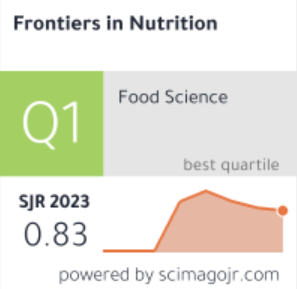摘要
背景:接受颅脑手术的患者通常需要尽早接受肠内营养(EN)以获得能量支持,从而改善神经系统的预后。然而,腹泻是与肠内营养相关的常见并发症,会影响患者的康复和整体预后。本研究旨在确定颅脑手术后接受肠内营养的患者出现腹泻的临床风险因素:方法:回顾性收集 2021 年 1 月至 2022 年 12 月滨海县人民医院神经外科和神经外科重症监护室住院患者的临床资料。比较腹泻组和非腹泻组的性别、年龄、液体保存、输液时间、管道评估、输液过程中的加热、输液速度、输液后查房、口腔护理等变量。根据 LASSO 回归得出的变量,采用多变量逻辑回归分析这些变量与腹泻发生的关系。结果:根据纳入和排除标准,颅脑手术后接受EN治疗的患者出现腹泻的概率为0:根据纳入和排除标准,本研究共纳入 141 例患者,其中腹泻组 50 例,非腹泻组 91 例。以下因素与腹泻明显相关:年龄≥ 70 岁(OR:2.240;95% CI 1.110-4.520)、EN 前未进行管道评估(OR:3.807;95% CI 1.702-7.643)、未加热 EN 制剂(OR:3.188;95% CI 1.853-6.722)、未控制正常输注速度(OR:1.721;95% CI 1.136-3.890)、EN 后未及时进行输注后查房(OR:2.260;95% CI 1.454-5.075)以及 EN 期间未进行口腔护理。多变量逻辑回归分析确定了两个独立的腹泻预测因素:EN期间未加热(OR:2.135;95% CI 1.716-5.851)和EN期间未进行口腔护理(OR:1.125;95% CI 1.025-1.652)。根据这两个变量开发了一个诊断提名图,用于预测接受 EN 的颅脑手术后患者发生腹泻的概率。该提名图具有很强的预测能力,AUC 为 0.848(95% CI 0.778 至 0.918):结论:颅脑手术后接受 EN 后发生腹泻有多种因素。一个包含两个独立预测因素的提名图--在输注 EN 时缺乏加热和缺乏口腔护理--显示出很强的预测能力,可作为早期风险评估的有用工具。这些研究结果突显了在使用耳鼻喉科用药期间采用加热方案和保持口腔卫生对降低腹泻风险和改善术后护理效果的重要性。Background: Patients undergoing craniocerebral surgery often require early enteral nutrition (EN) for energy support to improve neurological prognosis. However, diarrhea is a common complication associated with EN that can affect recovery and overall prognosis. This study aims to identify the clinical risk factors for diarrhea in patients receiving EN after undergoing craniocerebral surgery.
Methods: The clinical data of patients hospitalized in the Department of Neurosurgery and Neurosurgical Intensive Care Unit of Binhai County People's Hospital were retrospectively collected from January 2021 to December 2022. Variables such as sex, age, liquid preservation, infusion duration, pipeline assessment, heating during infusion, infusion rate, post-infusion rounds, and oral care were compared between diarrhea and non-diarrhea groups. Based on the variables obtained from the LASSO regression, multivariate logistic regression was employed to analyze their association with the occurrence of diarrhea. A diagnostic nomogram was constructed to predict the probability of diarrhea in patients receiving EN after craniocerebral surgery.
Results: According to the inclusion and exclusion criteria, 141 patients were enrolled in this study, including 50 patients in the diarrhea group and 91 patients in the non-diarrhea group. The following factors were significantly associated with diarrhea: age ≥ 70 years (OR: 2.240; 95% CI 1.110-4.520), no pipeline assessment before EN (OR: 3.807; 95% CI 1.702-7.643), no heating of EN preparations (OR: 3.188; 95% CI 1.853-6.722), no control of normal infusion rate (OR: 1.721; 95% CI 1.136-3.890), no timely post-infusion rounds after EN (OR: 2.260; 95% CI 1.454-5.075), and no oral care during EN. Multivariate logistic regression analysis identified two independent predictors of diarrhea: no heating during EN (OR: 2.135; 95% CI 1.716-5.851) and no oral care during EN (OR: 1.125; 95% CI 1.025-1.652). A diagnostic nomogram based on these two variables was developed to predict the probability of diarrhea in postoperative craniocerebral surgery patients receiving EN. The nomogram demonstrated strong predictive performance, with an AUC of 0.848 (95% CI 0.778 to 0.918).
Conclusion: Various factors contribute to the occurrence of diarrhea after receiving EN after craniocerebral surgery. A nomogram incorporating two independent predictors-lack of heating during EN infusion and absence of oral care-exhibited strong predictive ability and may serve as a useful tool for early risk assessment. These findings highlight the importance of incorporating heating protocols and maintaining oral hygiene during EN administration to reduce the risk of diarrhea and improve postoperative care outcomes.

 求助内容:
求助内容: 应助结果提醒方式:
应助结果提醒方式:


